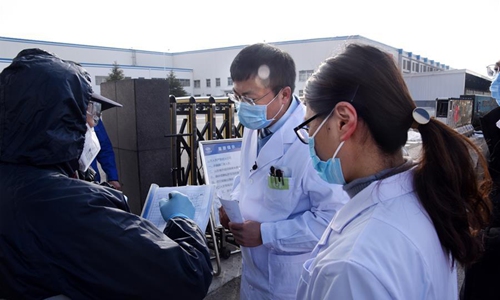HOME >> CHINA,SPECIAL-COVERAGE
Migrant workers in Hubei face job discrimination amid outbreak
By Chen Qingqing Source:Global Times Published: 2020/2/18 23:46:46
Job discrimination feared could lead to social instability

A medical service team check a record of workers' body temperature at the base of auto maker SGMW in Qingdao, east China's Shandong Province, Feb. 17, 2020. To ensure the normal production of enterprises after resuming work, Xihai'an (West Coast) New Area of Qingdao has set up medical service teams to serve enterprises. The first batch of 279 medical personnel of 50 medical service teams were stationed in key enterprises to assist in the epidemic prevention and control. (Xinhua/Li Ziheng)
As China is striving to return to work after Spring Festival, migrant workers from COVID-19 outbreak epicenter Hubei Province are having difficulty finding employment or returning to work in other regions due to enhanced prevention and control measures nationwide, which has partially fueled discrimination against people from the province.
A news video clip circulating on social media shows that some jobseekers from Hubei Province are being rejected by hotels in Shenzhen, South China's Guangdong Province, and they had to sleep on the streets.
In another case, a migrant worker was kicked out by his landlord as he is originally from Huanggang, a city neighboring Wuhan in Hubei which was also hit heavily by the virus, even though he did not return to Hubei for Spring Festival.
They also found it more difficult to find a job as some companies refuse to recruit people from the province. "Whether it's for a delivery person or security guard, they don't want to hire Hubei people now," a migrant worker was quoted as saying in the video.
Some even used harsh words at them such as "the disease comes from Hubei, you don't have any chance [to get the job]," he said.
Some factory owners in Dongguan, a manufacturing hub in Guangdong, have told workers from Hubei not to come back as scheduled due to concerns that people from the epicenter of the outbreak appeared to be highly contagious, and could pass the virus to others.
"There are some recruitment signs in Dongguan showing that factories don't hire people from Hubei," a local worker surnamed Yang, who has been working in the electronics industry for years, told the Global Times.
A construction site worker from Chongyang county in Xianning, Hubei told the Global Times that it is now impossible for migrant workers to return to work as most of the traffic between the province and other regions has been cut off. "I paid rent for my room in Guangzhou in advance before I returned to my hometown, fearing the landlord would kick me out," he said, noting that construction work has been suspended for about 10 days.
"We sometimes mock ourselves that Hubei people have become a 'scourge,'" he said.
The world's second-largest economy had about 290 million migrant workers in 2019. Hubei has also recorded a large number of outflow workers, as the central provinces saw numbers of migrant workers rise by 2.4 percent year-on-year in 2019, official data showed.
Shen Jianfeng, a professor at the Law School of the Central University of Finance and Economics, said that excluding specific labor groups from competition in the labor market without reason or with irrelevant standards constitutes employment discrimination.
It is geographical discrimination to exclude workers from specific regions, he noted.
"Under the current pressure of epidemic prevention and control work, it seems reasonable for companies to be more cautious concerning workers from Hubei for safety reasons, but the goal could be achieved by other methods including health checks, temperature screening or travel history investigations," Shen said, noting that employers should not just simply shut the door on them.
The outbreak has already become a major test not only for governance in Hubei but also for authorities across the country, analysts said, urging policymakers not to come up with "one-size-fits-all" ideas, or implement policies in a reckless way.
Some netizens on Weibo are also worried that discrimination will lead to more social problems including high unemployment and social instability, and authorities in other regions should deal with the problem in a more humane manner.
"Refusal is the simplest and roughest treatment. It is understandable that people would refuse Hubei people when they have been trapped in ignorance and panic at the beginning of the outbreak," Shen said, noting that as the epidemic has evolved for about one month, people should have a more rational understanding about the epidemic rather than dealing with the matter in such a simple and rude way.
Newspaper headline: Hubei workers face barriers
Posted in: SOCIETY